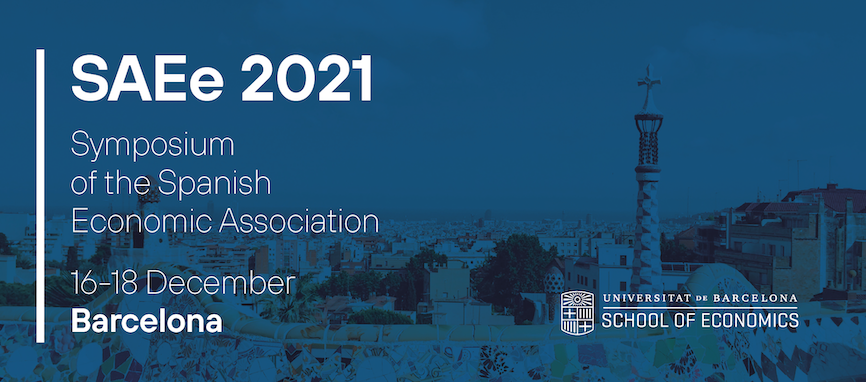The SAEe PhD School in Economics is a one-day event, that takes place on the day before the start of the Simposio de la Asociación Española de Economía (SAEe). It consists of a full day of lectures with prominent speakers who offer a broad perspective of their research areas. The School also features a session on early career advice for PhD students; on topics such as surviving the PhD, research presentations, choice of research topics, and the like. The first edition of the SAEe PhD School took place in Alicante in 2019.
The Spanish Economic Association and its Education Committee are pleased to announce that the 2nd SAEe PhD School in Economics will take place on December 15th, 2021 at the University of Barcelona School of Economics. The lectures will be given by Stephen Hansen (Imperial College Business School) and David Rossell (Universitat Pompeu Fabra) on the topic
“Data Science for Large and Unstructured Data”
The number of available places is limited. Applicants must submit their academic CV (which should include contact details of academic advisors or sponsors) by September 6th, 2021 to phd.school.sea@gmail.com.
Admission to the school will be based on academic merit. Applicants with a paper accepted to be presented at SAEe will be given priority. Participants in the School must register to the SAEe conference. The Spanish Economic Association will award 20 fellowships for students participating in the school. The fellowships will cover the registration fees for the selected candidates. Admission to the school and awarded fellowships will be announced on October 15th, at the same time as decisions on submissions to the Simposio are made public.
A short description of the program follows:
The School will have two sessions. The first session will deal with the analysis of data with many covariates, such as estimating treatment effects with many control variables, both via structured regression and more flexible machine-learning methods. We will introduce the problem and motivating examples, relevant considerations to obtain reliable inference and high-dimensional regression methods based on LASSO and Bayesian regression. We will also discuss flexible methods such as classification trees. Throughout, we focus on methods that attempt to guarantee reproducible findings via the Statistical quantification of uncertainty, and on providing high-level intuition over technical details.
The second session will introduce methods for unsupervised learning and unstructured data. Unsupervised learning addresses situations where, unlike regression, there is no pre-defined outcome, whereas unstructured data refers to non-standard data such as text. We discuss tools to extract interesting patterns from such data, and their use for problems in Economics.
Background
Participants should have taken first-year master level courses in mathematical statistics and econometrics at a minimum. Familiarity with the basic concepts of probability theory, statistical inference, and least squares methods will be required.
